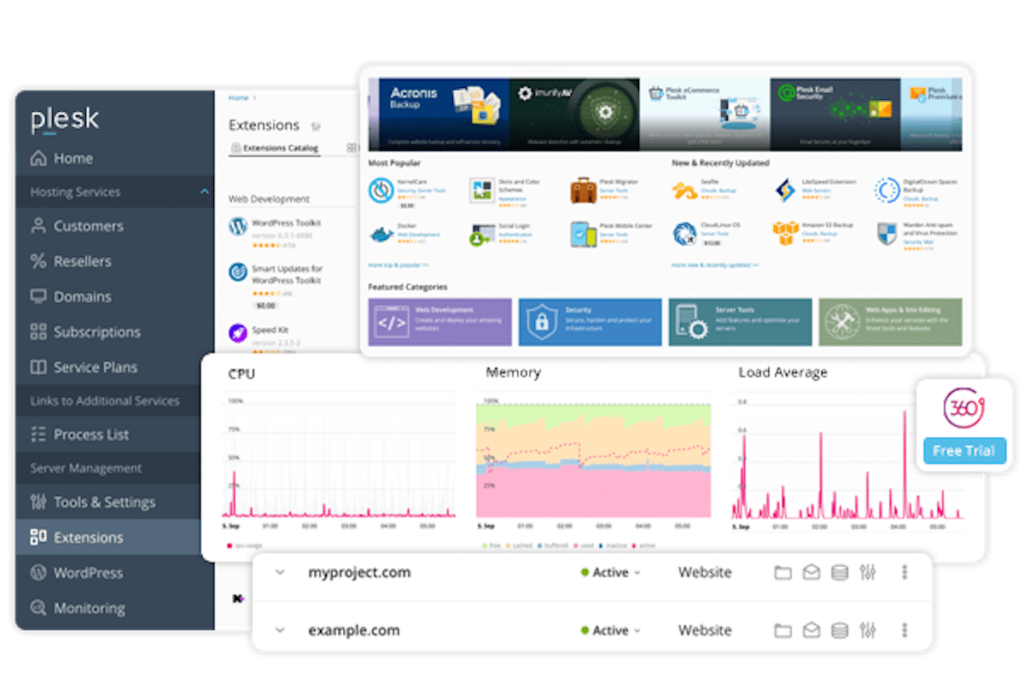The latest version of Plesk’s flagship control panel delivers enhanced security permissions, advanced migration capabilities, and fine-grained HTTP/3 management—designed for modern, multi-tenant cloud infrastructures.
Plesk has released Obsidian 18.0.71, bringing a wave of meaningful improvements for hosting providers, managed service providers (MSPs), and system administrators alike. With a focus on operational efficiency, robust security, and migration completeness, this release further consolidates Plesk’s position as one of the most versatile server control panels available for both Linux and Windows environments.
Seamless Migrations: Global Configurations Now Transferable
The latest update to Plesk Migrator enables the migration of server-wide configurations, including mail settings, the administrator profile, and extension setups. Supported migrations include Plesk for Linux (12.0 or later) and Plesk for Windows (17.0 or later), significantly reducing manual post-migration work.
This makes migrations to new Plesk servers far more seamless and suitable for complex, multi-domain hosting setups.
HTTP/3: Now Configurable Per Domain
On Plesk for Linux servers where HTTP/3 is enabled, administrators can now toggle HTTP/3 on a per-domain basis via the “Apache & nginx” section. This allows precise performance tuning and compatibility adjustments depending on each website’s needs.
Enhanced Restricted Mode: Fine-Grained UI and Feature Permissions
One of the most significant improvements is the expanded Restricted Mode, which introduces new permissions that allow granular control over access to UI elements and server functionalities for delegated admins or users.
New permission toggles include:
- phpMyAdmin access
- Bounce controls visibility
- Hostname and Plesk URL management
- Local FTP backups
- Visibility of website logs, forums, and help center links
In addition, access to key Plesk extensions like SSH Access, Advisor, Repair Kit, and Log Browser can now be entirely restricted, hiding UI elements and blocking direct URL access.
Extension Highlights: SSL, MariaDB, and mod_sftp Improvements
The update also brings several notable enhancements to key Plesk extensions:
- SSL It! now supports automatic securing of “mail.domain.com” subdomains with SSL/TLS certificates.
- MariaDB upgrades to version 11.4 are now supported via the GUI.
- The mod_sftp module is now included in Plesk’s proftpd package, allowing manual SFTP configuration (GUI support to follow in future releases).
Bug Fixes and UI Improvements
Plesk Obsidian 18.0.71 addresses a wide range of known issues, including:
- Email service inconsistencies in domain settings
- Problems with subdomains named “webmail”
- Errors in service plan propagation
- Watchdog’s misreporting of PHP-FPM status
- UI language encoding bugs for Arabic locales
- Stability improvements across AlmaLinux, Ubuntu 22.04, and CloudLinux systems
The update also enhances accessibility in the Plesk Installer and improves backup handling for extensions like Watchdog, Multi-Factor Authentication, and Site Import.
Third-Party Component Updates
To maintain security and compatibility, the release updates key third-party components, including:
- nginx 1.28.0, Roundcube 1.6.11, OWASP CRS 4.15.0, Phusion Passenger 6.0.27
- Updated support for ASP.NET Core 8.0/9.0, MariaDB, Python 3.13.4, and libcurl 8.14.1
- Compatibility with AlmaLinux 10 across extensions like Plesk Migrator, Firewall, Email Security, and Docker
Ready for What’s Next
With this release, Plesk Obsidian 18.0.71 positions itself as a future-proof solution for hybrid hosting environments. From HTTP/3 domain control to enterprise-grade migration options and more precise permission handling, Plesk continues to evolve to meet the demands of secure, multi-tenant, cloud-native deployments.
This update is a reminder that even in a fast-changing server landscape, a control panel can still be simple, powerful, and deeply customizable.

